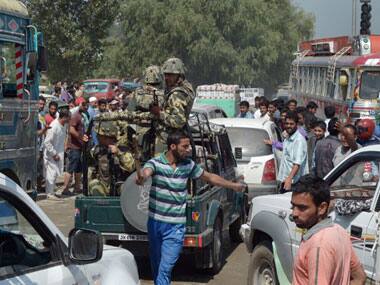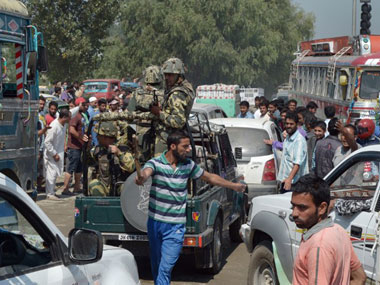Srinagar: On Tuesday morning, hundreds of relief carrying vehicles and traffic came to a halt when around two dozen residents of Qamarwari area of Srinagar blocked the Baramulla-Srinagar road. Angry mob shouted slogans against the state government and Srinagar municipal authority, demanding immediate removal of more than four hundred carcasses which have been floating in water, inside a dairy farm located in the residential colony. [caption id=“attachment_1719243” align=“alignleft” width=“380”]
 The traffic on the Baramulla-Srinagar road was blocked by protesting residents. AFP[/caption] On 7 September (last Saturday), the caretakers of a dairy farm, which is managed by the Army, could not untie hundreds of cattle when the area was marooned by floodwaters. Almost all the cows in the farm died while some of them were washed away by fresh floods. The residents said the neighbourhood around the farm is stinking of dead animals and there is no relief work on from the government. “We are all feeling sick over here because of the overpowering smell of dead cows. No one is removing them from here,” resident Ghulam Qadir Mir, 55, who led the protest told Firstpost. Ten days after the fresh floods hit the Valley, sanitation workers of Srinagar Municipal Committee (SMC) are yet to come back to work. Several animal carcasses are still floating in the city, while more than 75,000 people are still living in submerged colonies. Although, water levels have decreased, threat of water-borne diseases remains extremely high, according to medical experts. Qamarwrai, located three kilometers north to Lal Chowk, the centre of Srinagar city, still remains submerged in water, but municipality workers are still missing in action. Stagnant canals filled with wreckage, trash and dead animals is floating around the city and garbage piled in drier areas has not been removed. Medical experts said, if relief work does not begin at the earliest, more than five lakh residents of Srinagar are facing an inevitable threat of water-borne diseases. Doctors in Sheri Kashmir Institute of Medical Sciences (SKIMS), one of the two state run hospitals presently functional in the capital which is catering to the population of Srinagar and the rest of Kashmir valley, said the inflow of patients could increase in coming days as the number of flood affected patients have started trickling from other areas too. “We have treated more than 18,000 patients in nine days, majority of them complained of respiratory and gastroenteritis problems,” Dr Showkat Ali Zargar, Director of SKIMS, told Firstpost. As the water levels still remain high in many parts of Srinagar and in south Kashmir, residents have been complaining of respiratory track infection, caused mainly due to stagnant water, doctors said. Zargar added that the influx of patients from the flood-affected areas has increased and on an average his hospital receives more than two thousand patients now. “The problem of stagnant flood waters should be immediately solved. If not it could lead to an epidemic,” he said. Thousands of people have been rendered homeless and anger against the Jammu and Kashmir government is rising for its lack of preparedness to deal with a disaster of this scale. Hundreds of people blocked the national highway near Bemina and demanded that the government should immediately provide them with pumps so that water from the colonies could be removed. “We will not allow any movement on the highway till the government provides us a with suction pumps. Our homes will collapse in few days,” Firdous Ahamd, a resident of Gousia colony of Bemina, said. The central government has already delivered 25 water filtration plants with the capacity to filter 400,000 litres a day but with high demand this number seems very small. Health officials in Kashmir say outbreak of epidemic is feared as the overpowering smell of dead animals remains ubiquitous everywhere in Srinagar. “The Srinagar Municipal Committee (SMC) has failed to even remove the dead animals from water. How can we move back to our house,” Tariq Jameel, 42, who along with his family lives on a divider in Tangpora area of Srinagar, said. Approximately 200 people are dead in the state following the worst floods in a century. Around 1,200 villages in the Kashmir valley and 1,100 in Jammu region have been effected, around 400 villages have been totally submerged.
The traffic on the Baramulla-Srinagar road was blocked by protesting residents. AFP[/caption] On 7 September (last Saturday), the caretakers of a dairy farm, which is managed by the Army, could not untie hundreds of cattle when the area was marooned by floodwaters. Almost all the cows in the farm died while some of them were washed away by fresh floods. The residents said the neighbourhood around the farm is stinking of dead animals and there is no relief work on from the government. “We are all feeling sick over here because of the overpowering smell of dead cows. No one is removing them from here,” resident Ghulam Qadir Mir, 55, who led the protest told Firstpost. Ten days after the fresh floods hit the Valley, sanitation workers of Srinagar Municipal Committee (SMC) are yet to come back to work. Several animal carcasses are still floating in the city, while more than 75,000 people are still living in submerged colonies. Although, water levels have decreased, threat of water-borne diseases remains extremely high, according to medical experts. Qamarwrai, located three kilometers north to Lal Chowk, the centre of Srinagar city, still remains submerged in water, but municipality workers are still missing in action. Stagnant canals filled with wreckage, trash and dead animals is floating around the city and garbage piled in drier areas has not been removed. Medical experts said, if relief work does not begin at the earliest, more than five lakh residents of Srinagar are facing an inevitable threat of water-borne diseases. Doctors in Sheri Kashmir Institute of Medical Sciences (SKIMS), one of the two state run hospitals presently functional in the capital which is catering to the population of Srinagar and the rest of Kashmir valley, said the inflow of patients could increase in coming days as the number of flood affected patients have started trickling from other areas too. “We have treated more than 18,000 patients in nine days, majority of them complained of respiratory and gastroenteritis problems,” Dr Showkat Ali Zargar, Director of SKIMS, told Firstpost. As the water levels still remain high in many parts of Srinagar and in south Kashmir, residents have been complaining of respiratory track infection, caused mainly due to stagnant water, doctors said. Zargar added that the influx of patients from the flood-affected areas has increased and on an average his hospital receives more than two thousand patients now. “The problem of stagnant flood waters should be immediately solved. If not it could lead to an epidemic,” he said. Thousands of people have been rendered homeless and anger against the Jammu and Kashmir government is rising for its lack of preparedness to deal with a disaster of this scale. Hundreds of people blocked the national highway near Bemina and demanded that the government should immediately provide them with pumps so that water from the colonies could be removed. “We will not allow any movement on the highway till the government provides us a with suction pumps. Our homes will collapse in few days,” Firdous Ahamd, a resident of Gousia colony of Bemina, said. The central government has already delivered 25 water filtration plants with the capacity to filter 400,000 litres a day but with high demand this number seems very small. Health officials in Kashmir say outbreak of epidemic is feared as the overpowering smell of dead animals remains ubiquitous everywhere in Srinagar. “The Srinagar Municipal Committee (SMC) has failed to even remove the dead animals from water. How can we move back to our house,” Tariq Jameel, 42, who along with his family lives on a divider in Tangpora area of Srinagar, said. Approximately 200 people are dead in the state following the worst floods in a century. Around 1,200 villages in the Kashmir valley and 1,100 in Jammu region have been effected, around 400 villages have been totally submerged.
Jammu and Kashmir floods: Residents protest against Omar government's inefficiency
Sameer Yasir
• September 18, 2014, 21:03:04 IST
Hundreds of relief carrying vehicles and traffic came to a halt when around two dozen residents of Qamarwari area of Srinagar blocked the Baramulla-Srinagar road.
Advertisement
)
End of Article